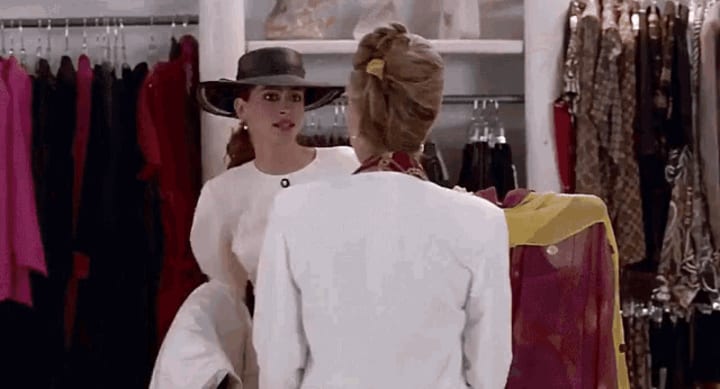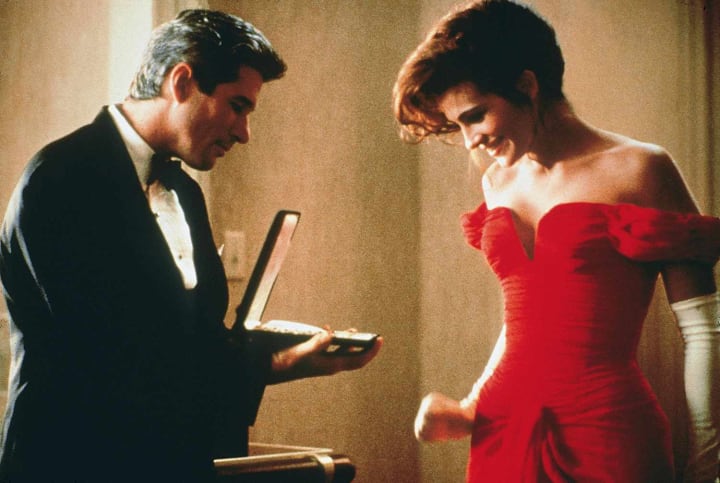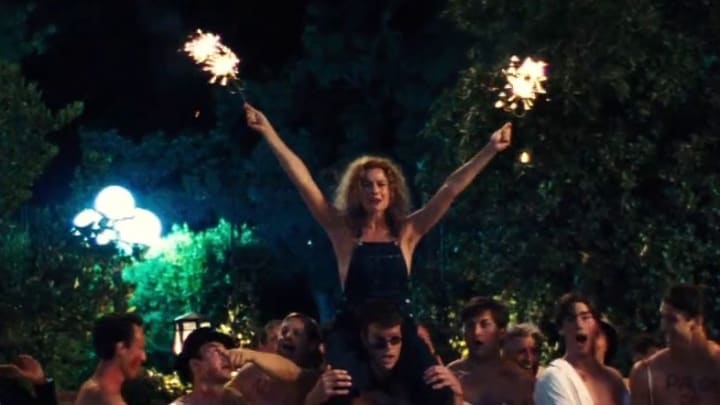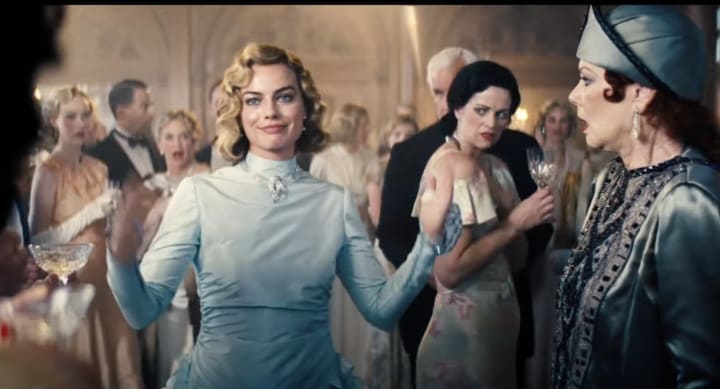Nellie LaRoy is the 'Pretty Woman' of 'Babylon'
How Damien Chazelle's 'Babylon' deconstructs the Pygmalion transformation Hollywood often relies on.

When Nellie LaRoy (Margot Robbie) first appears on screen in Damien Chazelle’s Babylon, I couldn’t stop thinking about how much she looked like Julia Roberts’ character (Vivian Ward) at the beginning of Pretty Woman. You know, before Richard Gere gives her $3,000 and a new wardrobe to transform her into a suitable escort for his week of business meetings in Los Angeles. Nellie’s big curly hair, skin-tight red halter dress, and black ankle boots are certainly more reminiscent of 1990 than 1926, the year Chazelle’s lavish film about the early days of Hollywood begins. Is this intentional? Are we meant to see in Nellie LaRoy’s journey as a Hollywood it-girl a deconstruction of Vivian Ward’s “Cinderella” transformation?
In Babylon and Pretty Woman, Nellie and Vivian navigate the realities of class and fairytale aspirations. Both these women want and believe they’re deserving of fairytale endings despite who people tell them they are. Pretty Woman, itself, functions like a modern retelling of Cinderella. A rich man (Edward Lewis played by Richard Gere) grants Vivian, a sex worker he picks up, the opportunity to remake her life and appearance to match the woman of class she is on the inside, suggesting that class is about character not money.
She undergoes her Pygmalion transformation, losing her big curly hair and knee-high boots to look like the type of woman who would shop in a Rodeo Drive boutique without being snubbed by the saleswoman. But Vivian isn’t changed by a new wardrobe; all that changes is how people see her. She realizes that the people in this world aren’t better than her, and she rejects Edward’s attempt to make her into a kept woman. “I want the fairytale,” she tells him.

Nellie LaRoy isn’t looking for a Cinderella fairytale, but a Hollywood one. The kind where you leave your small-town past behind and are reborn a star. In Babylon, Chazelle isn’t retelling this fairytale but deconstructing it, showing us what’s behind the image projected on screen. Nellie’s story begins like a Hollywood fairytale: A nobody gets into a producer’s house party with the help of a Mexican immigrant, Manny Torres (Diego Calva), who immediately falls in love with her. But Nellie doesn’t need Manny once she gets into the party. She’s spotted on the dance floor and randomly selected to replace the young starlet who just OD’d upstairs in a bar scene shoot the next day. And that’s the Hollywood fairytale—if you’re in the right place at the right time, you’ll get your shot because everyone’s replaceable.
Since Nellie begins her career in the pre-Code Hollywood era (at least before the widespread adoption of sound in film), there isn’t a push from film studios to change her image. Pre-Code refers to the years before the enforcement of the Motion Picture Production Code (July 1927-July 1934) that was created to clean up the film industry, when films were openly sexual and laced with other suggestive topics. Nellie becomes a star overnight when she plays a prostitute in a silent Western, dancing atop a bar in a saloon before a group of drunken old men, and even flashes one of her breasts on camera. Her female director (played by Olivia Hamilton) is most impressed with Nellie’s ability to cry on command and take direction for the flow of her tears. Despite her raw talent, Nellie LaRoy belongs to the time before Hollywood found morality…or hypocrisy.

In Nellie LaRoy and Vivian Ward, we have two women who, with a strike of luck, cross over into worlds that seek to marginalize and ostracize them. For Vivian to be accepted into Edward’s world of high finance and luxury and spending money like it’s nothing (or like it has the power to transform a woman into someone it would be more acceptable for Edward to sleep with), she has to change her clothes, her hair, and her manners. She has to become an actress, doing just enough to assimilate but knowing she can never belong. But Vivian falls in love with Edward and is changed enough by his world to know she can’t go back to the life she had before.
This could be the tragedy of Pretty Woman, but we get a happy ending because Vivian educates the rich business man to see her as more than a sex worker and the world he lives in for what it is: One where rich people pay a lot of money for sex, then treat the people who provide those services like trash. Yet, when Edward climbs the fire escape at the end of the movie to “rescue” Vivian and give her the fairytale, we’re left wondering what that fairytale actually is. Does Vivian now fully belong? Are they both too good for either world? In movies, we never really get to see what comes after a Pygmalion transformation.

In Babylon we do.
Nellie believes the studios and moviegoers accept her for who she is, until she overhears people mocking her and her father while she’s in the bathroom at a house party. She’s at once angry and hurt that nothing has changed about how people see her.
Fame has enabled Nellie’s worst habits on a monumental scale: She has more money to gamble, more coke to snort, more lavish parties to dominate. And throughout the film, we see her lash out whenever anyone suggests that she isn’t good enough, like when she forces guests at a party to drive out into the desert and ends up fighting a rattlesnake that all the men in attendance are too drunk or scared to confront.

Or when she lashes out at a party hosted by members of Hollywood high society. To prevent Nellie’s downfall, Manny, who has climbed his way to the top of the studio system, attempts to revamp her image—gone are her wild red hair and scanty dresses. Manny loves Nellie and thinks he can protect her if he proves to upper-class patrons that she has class and culture. But the party turns into Vivian Ward’s Rodeo Drive boutique moment, only cruder and more over the top.
Nellie’s disgusted by the snobbery, the hands of men slyly brushing women’s backsides, the hypocrisy of it all. She goes off script and tells everyone at the party what she thinks of them, then proceeds to stuff her face with food and throw up on the host’s carpet like the wild animal they suspect her to be.

Nellie LaRoy can no more go back to life before Hollywood than Vivian can go back to life before Edward. But she can’t play the character Manny creates for her; she refuses to ingratiate herself to people who use their money to make themselves appear better than everyone else. So instead of getting a new act, Nellie gambles her way to destruction. She doesn’t marry Manny, she doesn’t make a new life in Hollywood or Mexico. No one rescues her.
Nellie’s bobbed blonde hair at the end of the film, I’d argue, is reminiscent of Julia Roberts’s wig at the beginning of Pretty Woman, suggesting that nothing has changed. Nellie hasn’t assimilated, and Hollywood refuses to accept her. Nothing has changed because fairytales aren’t real, and they certainly shouldn’t be based on a woman transforming into someone “better” than she once was.

When we last see Nellie LaRoy on screen with her blonde hair bobbed and a little wild, we know that the Pretty Woman experiment has failed.
About the Creator
Maggie Blaha
Maggie is a placeless writer who is wandering around Europe in search of a home—a place where she can live simply, write often, and read always. She's currently living in Spain.






Comments
There are no comments for this story
Be the first to respond and start the conversation.